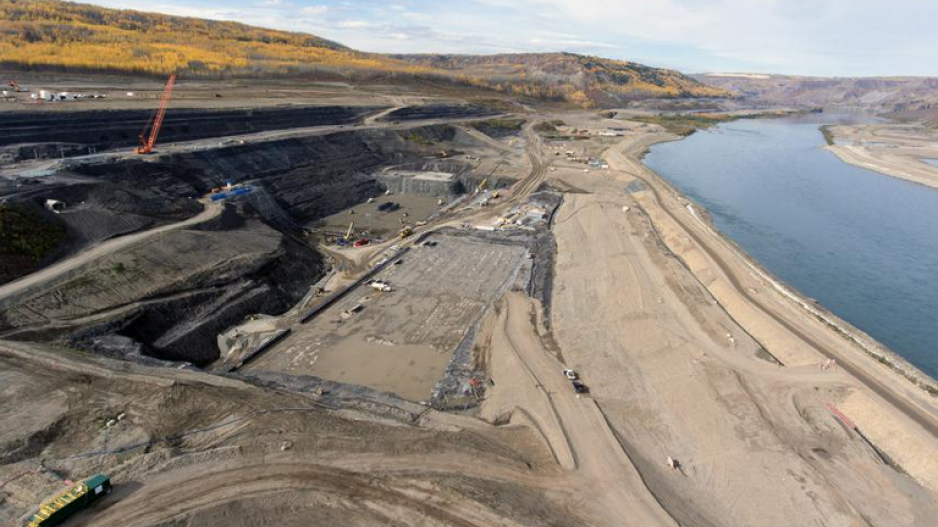In its final report on Site C, the commission says it is not convinced the project can meet its in-service date of November 2024. It states the project's contingency fund is already used up and it already 20% over budget.
It's also recommending that the “least attractive” of three possible scenarios would be to halt the project and resume construction at a later date. That would add another $3.6 billion to the project's cost. The other two options are completion and cancellation.
Cancelling the project will add another $1.8 billion in remediation costs to the $2.1 billion that will have been spent by the end of this year. In other words, the cost of terminating the project will leave BC Hydro with $3.9 billion in sunk costs.
The commission suggests the dam is not needed, stating that BC Hydro’s load forecasts are “excessively optimistic.”
Most damning of all, the BCUC finds that “increasingly viable alternative energy sources such as wind, geothermal and industrial curtailment could provide similar benefits to ratepayers as the Site C project, with an equal or lower unit energy cost.”
BC Hydro and a number of energy experts who have supported the project have insisted that large hydro-electric power would be the best option in terms of costs, compared with other energy sources, like wind power, so the BCUC’s opinion is a damning one.
"I don't see how the project could proceed, given the findings of the BCUC," said David Austin, a lawyer for Clark Wilson LLP who represented Clean Energy BC during BCUC hearings.
But there are more than just costs in terms of dollars and cents for Premier John Horgan to consider. There are political costs, as well.
Horgan will be under intense pressure by the Green Party to cancel the project. There are also pressures from two First Nations in the region to cancel it as well.
But more than 2,000 workers are employed on the project. Handing them pink slips around Christmas time, and explaining to taxpayers how they will have to absorb a $3.9 billion writeoff for a project that won't produce a single electron of electricity, puts Horan in "a no-win place," says Sauder School of Business professor Werner Antweiler.
"To me, it's a lot of taxpayers' money squandered, and so I think at the end of the day cancellation is not going to save us that much money," he said. "The right decision would have been made before this project got started, looking at the alternatives. Now that we are down the road, they have created this train that's virtually impossible to stop without actually wasting a lot of money and squandering it."
The NDP government has stated it will make a final decision on the fate of the project by the end of this year.
"This will be an extremely difficult decision," Michelle Mungall, B.C. minister of Energy, Mines and Petroleum Resources said in a press release.
"We inherited a project that was advanced by the previous government without proper regulatory oversight, is now more than two years into construction, employs more than 2,000 people, and on which about $2 billion has already been spent. We are going to take the time we need to make a decision on Site C that works for B.C. families, businesses and the sustainability of our environment and economy."
At a press briefing Tuesday, October 31, Horgan said his government will study the BCUC report over the next few weeks and has tasked his minister of aboriginal relations and reconciliation, Scott Fraser, to tour the Peace River region to meet with First Nations to discuss the report.
While other First Nations in the region have accepted the project and benefits agreements that go with that acceptance, two – West Moberly and Prophet River – remain bitterly opposed.
They have already lost a number of court battles over Site C, with the courts determining that the consultations had been adequate.
Asked if his government’s formal embrace of the United Nations Declaration on the Rights of Indienous People (UNDRIP) changes the conversation with respect to First Nations on Site C, Horgan said it did not.
“On UNDRIP, I’m looking forward rather than retrospectively,” he said. “I think I’ve been pretty clear on that. The Site C decisions were made prior to my government being sworn in and putting in place a commitment to UNDRIP. So I’ll put that to one side.”
However, he pointed to a Joint Review Panel report that said the project’s impact on First Nation hunting and fishing rights were “not mitigable.”
So if hold-out nations that are still opposed to the project push their objections into the courts, and they get a ruling in their favour, that could change the conversation.
“The rights and title question that Harry Swain touched upon, the constitutional barriers that he touched upon, I don’t believe the courts have addressed because that hasn’t been how the question’s been put,” Horgan said.
Swain was the commissioner of a Joint Review panel that reviewed the Site C project. The panel confirmed that the Site C project was the most cost effective option for new power, but noted that it disagreed with BC Hydro’s timeline.
Swain has since come out as a vocal critic of the project. In an oral submission to the BCUC, he said neither Site C dam nor alternative energy sources would be needed, because BC Hydro’s load forecasts are dramatically over-estimated and power is available to B.C. under the Columbia River Treaty with the U.S.
“We don't need Site C, and we don’t need a replacement portfolio,” he told the BCUC.
The BCUC was specifically excluded from reviewing the Site C dam by the previous Liberal government. The new NDP government decided it would put the project to the BCUC for a review that it said should have happened at the start.




